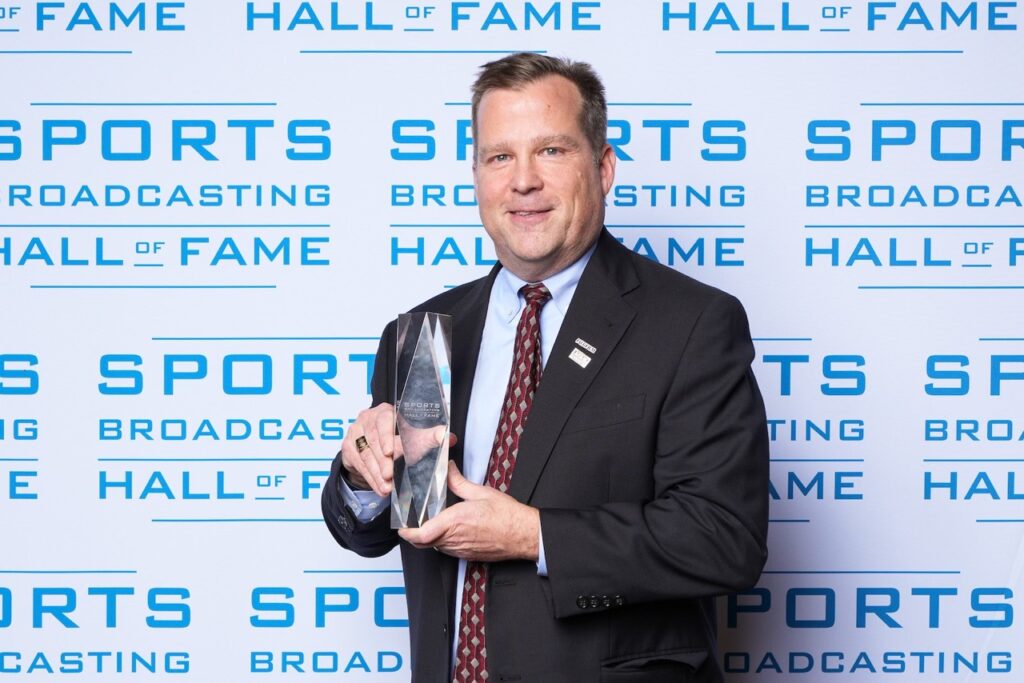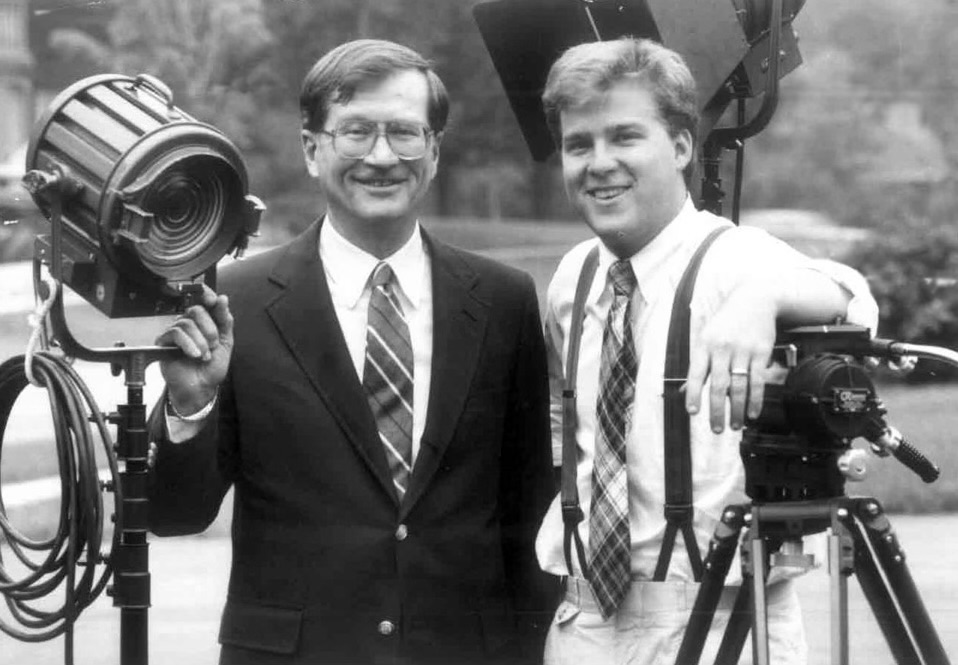
By David A. F. Sweet
Think of the camera angles sports viewers take for granted: the above-the-rim shot that shows tomahawk dunks during NBA games, the inside-the-penalty-box view displaying angry players claiming to be falsely accused during NHL contests, and the goal-post shot revealing game-winning kicks during NFL battles.

Tom Fletcher (left) gets together with NHL Commissioner Gary Bettman and Panavision General Manager Chris Konash.
Those remote-control innovations that have changed sports coverage were developed by Lake Forest resident Tom Fletcher and his family business, Fletcher Chicago. The Fletcher Cam’s influence was highlighted when he was inducted into the Sports Broadcasting Hall of Fame in New York in December.
“Fletcher Cams revolutionized the televising of our games,” said NHL Commissioner Gary Bettman, who spoke during a video tribute at the ceremony. “Because the game is so fast, all of these innovations made us as good a sport on television as all the other sports when the conventional wisdom at the time said that was not possible.”
Working with the broadcast departments of various professional leagues, Fletcher’s success with Fletcher Chicago was buoyed by technological advances. The original goal-judge camera implemented in the 1990s, for example, could block the view of a spectator 10 rows away; innovations soon decreased camera size significantly so no fan could complain.
“The biggest skill I have is I can see where things are going from a technological standpoint,” said Fletcher, a passionate hockey fan who cited the goal-judge camera as his favorite in a career of innovations.

Fletcher was inducted into the Sports Broadcasting Hall of Fame in December.
A photographer for the Daily Illini newspaper at the University of Illinois who also made movies during film classes before his 1985 graduation, Fletcher tried to get involved in the movie business after school. He took a sales job with a film company on a trial basis and was dispatched to San Antonio.
“It was the hottest summer of my life,” he recalled. “But I learned a lot about motion-picture lighting and more.”
He returned to Chicago, and Tom and his father Archie – who had enjoyed a long career with lighting companies — joined forces to co-found Fletcher Chicago, which sold or leased lighting, audio, and camera equipment from a River North office. Tom’s sister, Sally joined the business a few years later.
At first, Tom tried to persuade local TV stations to upgrade their equipment.
“I was always frustrated calling on studio technicians because they didn’t buy a lot of equipment. Their dimming systems could last for over 40 years,” Fletcher said. “So I went to the newsroom. That’s when Betacam hand-helds came out, so it was going from a 2-3-man crew to one camera person. The station was saving money on labor, so it could buy new gear.”
Fletcher turned his attention to sports. With the Chicago Stadium hosting the 1991 All-Star Game – best remembered for the rousing National Anthem at the outset of the Gulf War – Fletcher persuaded NBC Sports to install a remoted-controlled camera under the scoreboard, seizing space previously reserved for horns removed from the Wirtz’ family yacht that blared after Blackhawk goals. The new angle worked. In the spring, he suggested the same shot for the Los Angeles Lakers-Chicago Bulls NBA Finals. Fletcher explained to Andy Rosenberg, the director of NBC Sports, that beyond the tipoff, the announcers could use a telestrator to examine how the Bulls ran the triangle offense via the remote-controlled camera shots. He faced resistance – not from NBC, but from the Chicago Stadium operations manager.
“The operations manager didn’t want to lower the scoreboard to install it. He said, ‘What if it’s stuck down there before the NBA Finals?”’ recalled Fletcher, who ventured that the operations manager cared about lowering it this time as opposed to the NHL All-Star Game because of the hype around the Magic vs. Michael matchup. Eventually, NBA Commissioner David Stern approved the camera’s installation.
The ensuing Bulls’ dynasty was a game changer for Fletcher Sports.
“We knew teams had to go through Chicago. Andy Rosenberg always wanted something new with the cameras, and USA Today columnist Rudy Martzke would always write about it,” Fletcher said. “We always let credit go to the broadcaster, even though everyone in our small industry knew we were creating the camera angles.”

Fletcher’s new venture takes photos of fans celebrating and then offers them a keepsake of the exciting moment.
The Fletcher brand was also involved in motion pictures. During the filming of Prelude to a Kiss, Fletcher rented the film a remote-control camera system known as a Hot Head.
One day, Fletcher received a call that the Hot Head wasn’t working and hustled over to the set, where Alec Baldwin and Meg Ryan, among others, were waiting.
“I was incredibly scared,” Fletcher said. “But I saw it wasn’t plugged in. I plugged it in, and it worked.
“The camera assistant said, ‘Stay back for a few minutes. They can’t see it’s that easy a fix.’ The producer said to me we cost them a ton of money because they couldn’t shoot. I didn’t blame the camera assistant.”
When digital cinematography took off, the motion picture division boomed, even renting lenses to George Lucas for a Star Wars movie. By 2007, according to ReelChicago.com, Fletcher Chicago was “the biggest high-end camera sales and rental outlet in the Midwest, with $20 million worth of inventory.” Its previous River North office had been traded for a 24,000-square-foot building on Goose Island.
The Fletcher family sold both the sports and movie division about a decade later. Today, Fletcher and his son Austin are working on a new venture called MyMomento, along with sister Sally and Fletcher’s life-long friend and serial entrepreneur Scott Whalley. They install still cameras at stadiums that take pictures of every fan celebrating the exciting moments, such as when the home team scores a touchdown. Fans can order a commemorative ticket of the scene via an app. The Seattle Seahawks and Kracken have signed on, along with the Tampa Bay Lightning.
“Fans miss the physical ticket,” explained Fletcher, who noted facial recognition is not part of the process. “It was my son’s idea. It’s been rewarding to work with my son after working with my dad.”

Fletcher, a Lake Forest High School graduate, co-founded Fletcher Chicago with his father, Archie.
His father Archie passed away in 2023 – one day, in fact, before Tom received the call he had been nominated for the Sports Broadcasting Hall of Fame.
“It was a bittersweet moment because he was the one I wanted to share the news with,” Fletcher said.
During his speech at the induction ceremony, Fletcher mentioned the timing of his father’s passing.
“I knew my Dad was looking down from above and helping,” he said, “but I didn’t know he was going to work that fast!”
The Sporting Life columnist David A. F. Sweet can be reached at dafsweet@aol.com.







